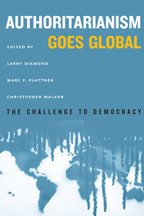
Reviews
This is an exceptionally important, insistently reasonable, delightfully readable book.
Anyone concerned with higher education's role in the public good, especially researchers and practitioners, will find [What Universities Owe Democracy] well worth the read.
When the president of a major university publishes a deeply researched, closely reasoned, strongly argued powerful idea and call to the profession to respond to an urgent crisis in our national history, it is highly likely to become a classic in the literature of higher education. Ronald Daniels, president of Johns Hopkins University (co-authoring with colleagues Grant Shreve and Phillip Spector), has accomplished that with this new book.
[A] forceful argument for universities as change-makers. Daniels wants the American university and its graduates to find more ways to challenge power.
Daniels makes an important contribution to not one but two urgent and topical subjects: the weakening of American self-governance and the overall role of higher education in countering that dangerous trend. One hopes that Daniels's sterling academic reputation, and that of his institution, leads to a wide readership.
Ronald J. Daniels, the president of Johns Hopkins University, makes a compelling case that American universities are failing to meet their civic duty.
Daniels recognizes that the public's willingness to support higher education's democratic mission depends on universities reengaging with the nation-state....Daniels's wager is that the end is not inevitable, that universities can reassert their centrality to the American liberal democratic project. I hope he's right.
The fraying of democracy around the world that is the key premise of Ronald J. Daniels's important book, What Universities Owe Democracy....Daniels's book does two things that are desperately needed and that make it important reading for anyone working in or adjacent to higher education. First, it shows us how to contextualize the work we do in universities—and libraries, and as researchers and publishers....Second, it offers some direction of travel and an agenda in a moment when both feel urgently needed and in short supply.
[Daniels] offers concrete, actionable and reasonable ideas for how universities can support liberal democratic values and goals. Students of the evolution of the university will learn much from reading this book....Compelling.
American colleges and universities are being tested like never before in their commitment to inquiry and dialogue that is as open as it is diverse. As the son of a Jewish refugee who fled Poland in 1939, Ron Daniels' insights on the essential role of colleges in a democracy ring with particular power. He offers a compelling history of the important relationship between higher education and democratic values—and a path forward to strengthen both.
One of America's outstanding university presidents dares to tackle what ails US higher education. His recommendations are radical, exciting, and doable. This is one of those books that will define the conversation on campuses across the country.
Weaving personal history with his passion for democracy, Daniels has crafted a beautifully written story of the essential role of universities in maintaining and reinforcing fairness and justice in America. To discover the new role universities must play in the contest between liberal and illiberal ways of thought, and how institutions of higher learning need reform, read this essential book. There is no other like it.
In this timely and compelling book, Ron Daniels makes a powerful argument for the central role universities must have in ensuring the public good and fostering liberal democracy. Readers will appreciate his careful analysis, his global perspective, and his inspiring personal story, and they will come away understanding the urgency of his message.
The methods to defend democracy must be taught, and What Universities Owe Democracy is our textbook.
Daniels rivets attention on the obligation of universities when democracy is in global retreat and provides specific, illustrative changes needed not just to improve education and research but to tackle mounting distrust of journalism and science, and intolerance toward people with different views. Hopeful despite the clear-eyed account of profound challenges, this book is essential for any who care about the prospects for social trust, truth-seeking, and the promise of America.
Ron Daniels is a pioneer. In this critically important work, he examines the systemic and systematic reforms we need to achieve equity in US higher education. There has never been a more urgent moment for change.
Book Details
Preface
Introduction
1. American Dreams: Access, Mobility, Fairness
2. Free Minds: Educating Democratic Citizens
3. Hard Facts: Knowledge Creation and Checking Power
4. Purposeful Pluralism: Dialogue
Preface
Introduction
1. American Dreams: Access, Mobility, Fairness
2. Free Minds: Educating Democratic Citizens
3. Hard Facts: Knowledge Creation and Checking Power
4. Purposeful Pluralism: Dialogue across Difference on Campus
Conclusion
Acknowledgments
Notes
Index






